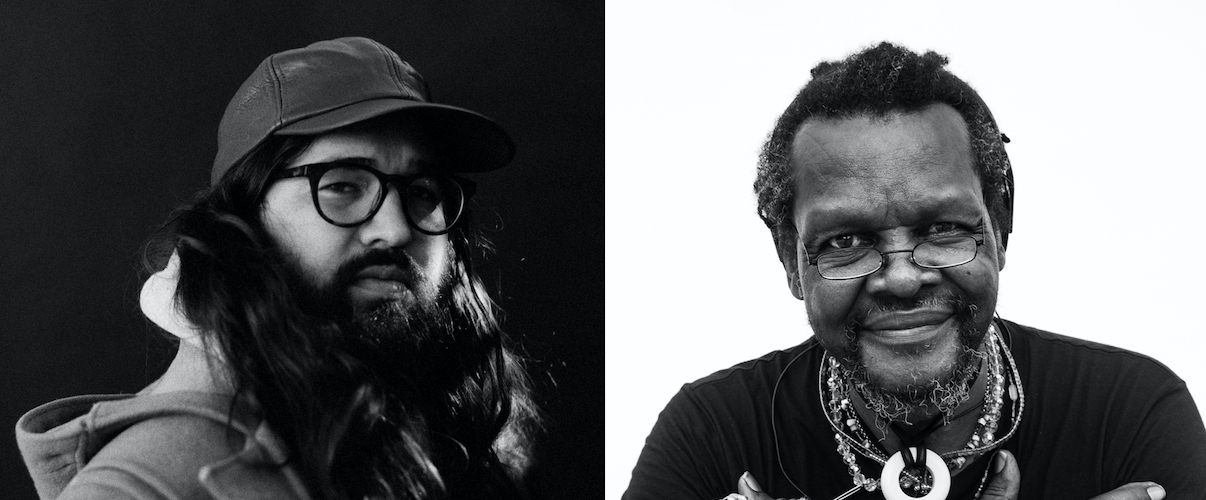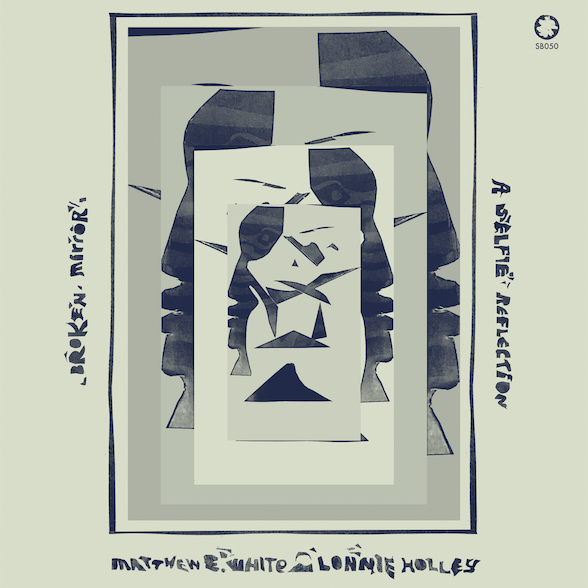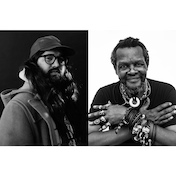Matthew E. White & Lonnie Holley
In November 2018, Matthew E. White wanted to reinvent his approach to songwriting, at least for a session. In the throes of shaping the follow-up to his second studio album, 2015’s Fresh Blood, White assembled a trusted posse of seven musicians in Richmond’s Montrose Recording, one of his favorite spaces in the city. He directed the septet through a series of loose, largely gestural compositions, guiding their spirited improvisations in the iconoclastic tradition of Electric Miles. The sounds were tremendous, an array of keyboards and guitars bejeweling the momentum of an interlocking four-piece rhythm section. But the results didn’t quite fit the record in process, so White shelved the jams until the right muse arrived.
That, turns out, was Lonnie Holley, whose beautifully wizened voice soon spilled a kind of cosmic wisdom across White’s waiting work. The result—the five-track triumph Broken Mirror: A Selfie Reflection—is more explosive and urgent than anything either artist has ever made. Aggressive but ecstatic, playful but pointed, Broken Mirror is a trenchant though empathetic social critique, set to almighty groove.
Holley and White may seem like unlikely collaborators, divided as they are by decades and disciplines. Holley, 70, first earned attention as a sculptor far removed from the fiefdom of fine art, using society’s detritus to create curious bricolages that ferried deep narratives of ancestral pride, enduring pain, and eternal hope. His music—privately stowed on stacks of cassettes before he released his staggering 2012 debut, Just Before Music, at the age of 62—aired those ideas over extemporaneous pieces for prismatic keyboards. But on Big Inner and Fresh Blood, White, now 38, came into acclaim as one of his generation’s most meticulous songwriters and arrangers. Stretching his assuredly soulful voice like a smile across little symphonies of strings, horns, choirs, and percussive cavalcades, White commanded sounds where Holley seemed to glide inside them.
But the pair shares deep Alabama roots—Holley was born in Birmingham, while much of White’s family remains just south of the city, a sort of second childhood home. More important, Holley and White regard music as an uncanny vessel for otherwise-impenetrable notions of sorrow, suffering, and solidarity. Though they’d long existed in one another’s overlapping orbits, they recognized this kinship when White and the crew of Richmond ringers that had played on those earlier jams backed Holley during an April 2019 set in the Virginia capital, as unrehearsed and charged as everything Holley does. “One of the best shows I’ll ever do, so dialed in,” White remembers.
When Holley invited White to join him for a subsequent concert a few hours south in Durham, North Carolina months later, White decided to pull those instrumentals from the top shelf. He wanted Holley—a visionary and intuitive lyricist who uses pedestrian details to ask existential questions—to run with them. Working alongside co-producer Adrian Olsen, who had helmed those original Montrose sessions, White dug into those takes and reimagined them with a dub sensibility, wrapping psychedelic textures around thick rhythms like spools of neon lace.
The day after that Durham performance, White sat with Holley and played bits of two-dozen edits from those year-old recordings. Holley listened to 20 seconds and either passed or proclaimed the images that the sounds conjured. When he liked something, he’d consult a notebook overflowing with lyrical conceits, then sing complete first takes to music he’d never heard. White sat gobsmacked, transfixed by Holley’s ability to anticipate modulations and movements within these totally new productions. For four hours, Holley sang of trips into space and troubles with social media, of the need to reconnect with our basic humanity and to disconnect from the baseness of it. Minus modest edits and slight overdubs, Broken Mirror: A Selfie Reflection was finished on the spot, a lightning strike looking for a place to land.
These five tracks are balls of energized contemplation, Holley crooning grievances and observations above surrealist grooves so irrepressible and heavy that the words strike with the force of gospel. Holley strolls into “I Cried Space Dust” as if he’s wandered into the On the Corner sessions and offered unsolicited insights on true transcendence. “I’m Not Tripping” is an anthem of self-worth and self-enjoyment for a society mired in self-doubt, the words breaking like light beams through clouds of atomized drums and synths. And Holley begins the title track as a character mindlessly staring into a cell phone, captivated by his own image like Narcissus at water’s edge. Holley ponders the egotism of projection over dizzying keyboards and guitars so jagged they conjure fractured glass. By song’s end, he’s mocking this infrastructure of pandering for likes, jeering us all above a savage bassline that dares you to differ.
Broken Mirror: A Selfie Reflectionis a timely callout to the power of collaboration, of kindred spirits connecting in crowded rooms. More important, though, is this collision of two profoundly Southern artists, meeting to shed expectations of generation and genre, scene and situation and exchange truth, wisdom, and energy. The real world is more complicated than a pretty digital picture, bowdlerized of blemishes. As Broken Mirror: A Selfie Reflection reminds us, it can be more revelatory and transformative, too.










